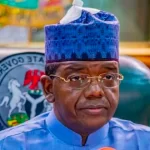Olutayo: How Nigeria ‘ll leverage AfCFTA to boost digital exports
Large market access and other opportunities await players in Nigeria’s technology industry as the country prepares to commence export of goods and services to a few countries outside ECOWAS regional block under the Guided Trade Initiative (GTI) of the African Continental Free Trade Area (AfCFTA).
Speaking recently at a workshop on the Digital Trade Protocol in the AfCFTA Framework, Olusegun Olutayo, Senior Trade Expert/Lead, Trade Enablement at NAC-AfCFTA, told the participants that Nigeria, as a significant player in Africa’s digital economy, stands to gain considerably from AfCFTA market access than its close competitors such as Egypt and South Africa.
Olutayo, further explained that the secretariat of the National Action Committee on AfCFTA under the leadership of the Executive Secretary Olusegun Awolowo is committed to ensuring all Nigerian stakeholders utilize the protocol to boost digital exports, stressing the significance of the workshop which was the first of its kind since the adoption of the AfCFTA Protocol on Digital Trade by the member countries.
The Protocol also known as the AfCFTA Digital Protocol, was adopted at the 37th African Union Heads of States Summit held on 17 – 18 February 2024. It establishes an important legal instrument that will support and enable an acceleration of technology-driven innovation and commerce in Africa. The protocol covers important areas such as data governance, data protection, cross-border data flows, online consumer protection, cybersecurity, and emerging technologies such as AI.
READ ALSO: Nigeria begins export under AfCFTA to Rwanda, Kenya, others in April
The Senior Trade Expert, Olutayo, highlighted critical Articles of the Protocol that Nigerian exporters should pay attention to as including “Article 6 – Customs Duties: Concerns over the imposition of customs duties on digital products”.
He listed other critical articles as: “ Article 20 – Cross-Border Data Transfers: Regulation of data transfers, data privacy, and localization requirements and Article 38 – Pan-African Digital Trade Centre: Establishing a hub for digital trade capacity building and policy development.”
On status of Digital Trade in Africa, Olutayo said the opportunity lies in building Digital Trade, removing barriers to Digital Trade and providing incentives for the Digital Economy to encourage intra-African trade activities and grow it above the current 15 per cent.
Meanwhile, Nigeria government has announced it commitment to export of goods and services to a few countries outside ECOWAS regional block in April, 2024.
The Executive Secretary of the National Action Committee on AfCFTA, Olusegun Awolowo, disclosed this recently in Abuja at a workshop themed ‘’Preparedness for AfCFTA Digital Trade Protocol’’.
According to Awolowo, GTI enables African countries to trade outside their regional blocks before the full implementation and commencement of trade under the AfCFTA, adding that ‘’We are hoping to start trading under the GTI by the end of April. So, It will be on record that Nigeria has now started export officially and formally’’.
He said by the end of April, a few Nigerian companies will launch trading under GTI with South Africa, Kenya, Cameron and Rwanda which Federal Government has signed the agreement with.
He said: “I would like to take a moment to reflect on our successful engagement with critical stakeholders in Lagos on Tuesday, 5th March. The constructive discussions and invaluable insights shared during that event underscored the significance of collaborative efforts in harnessing the transformative potential of the African Continental Free Trade Area. Building upon the momentum generated in Lagos, today’s workshop serves as another crucial platform for us to delve deeper into the implications and opportunities presented by the Digital Trade Protocol.”
Awolowo noted that the adoption of the AfCFTA Digital Trade Protocol marks a significant milestone in our journey towards economic integration and digital transformation.










